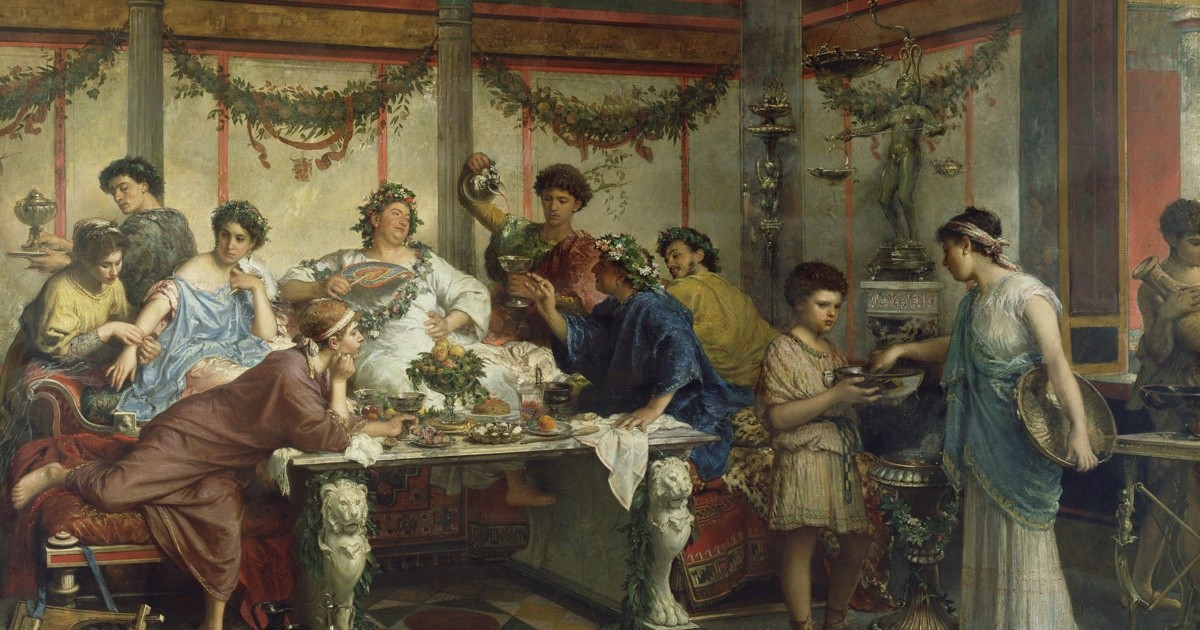The winter solstice arrives. Leisure dates are approaching, a certain debauchery, drink, party clothes and exchange of gifts. It would seem that we are talking about Christmas. However, I’m talking about a celebration of the ancient Romans: Saturnalia or the festivals of Saturn.
The Saturnalia: fun and gifts
the day of the god Saturn It was celebrated in Rome on December 17. Over the years, the period of festivities celebrated in his honor came to last a week, approaching what would later be the date of Christian Christmas. Although the emperor August Saturnalia was reduced to three days, later the official duration was extended to five. According to Suetonius, caligula added a day to the festivities as a populist measure.
Despite the fluctuations of the official calendar, people celebrated this festival for seven days. Some festivities came together with others close in time, as is the case today. And it is that after the Saturnalia came the feast of the sigillaria. This was also the name of the market where clay figurines and other products that were given away at this time were bought.
Saturnalia was a tremendously popular festival. It was a time for fun, relaxation, and even a reversal of social norms. The slaves enjoyed a certain freedom and the free dressed in the pillusa typical hat of the freedmen. Putting on this headdress was one of the many social role reversals characteristic of these festivals. In fact, in the saturnalia we find many carnival elements.
Betting on games of chance, which were legally prohibited for the rest of the year, was permitted, and everyone indulged in dice. There were judicial and school holidays. He kept the toga and dressed in the party dress, the synthesis. And, above all, she ate, drank a lot and exchanged gifts.
In Latin literature…
poets like catullus either Martial They worshiped the Saturnalia. However, not all Roman writers enjoyed the merriment of the festival. Pliny the Younger account in your Cards that on one of his farms he had an isolated studio. He withdrew to it during the noisy Saturnalia. “This way I don’t interfere with my family’s fun, nor do they interfere with their studies,” he says.
His contemporary Marcial, on the other hand, dedicates many epigrams to this party. In fact, he took advantage of this time to publish an annual edition of his poetry. The festive and relaxed atmosphere favored the reading of his work, often light and irreverent.
Marcial dedicated many epigrams to the exchange of gifts. Giving gifts was a fundamental element of ancient societies. The Romans in particular gave gifts on numerous occasions, not just in December. Presents were given at celebrations such as weddings and birthdays. at the party of the matronalia married women were feted. Gifts were also made after a convalescence, such as when we visit a sick person and bring them chocolates or flowers.
In many poems, Marcial complained about receiving ridiculous or second-hand gifts or, very often, about not having received anything: “You have not sent me any gift in exchange for my little gift and the five days of Saturn have already passed.” In another epigram he includes the list of gifts that he has received from one of his friends, made by third parties: small utensils and food (beans, olives, must, figs, plums…).
It was common, in fact, to give away food for the Saturnalia. In another composition, the lawyer Sabelo boasts of everything he has received. The list includes wheat, broad bean flour, incense, pepper, sausages, sweet wine, figs, onions, snails, cheese, olives, a set of cups and a napkin… a real “Christmas basket”!
But not all were food presents. There were them for all pockets. Suetonius He tells that Augustus gave away both luxurious and low-value objects for Saturnalia. This anecdote is probably alluding to the raffles, because sometimes the gifts were not delivered directly, but were raffled off at dinners as a form of entertainment.
Marcial dedicates an entire book to gifts, entitled apophoreta. It is a catalog of gifts, a fun and ingenious poetic exercise. Each present is described in two verses (a elegiac couplet), preceded by the name of the gift. The gifts are ordered thematically and the most expensive alternate with other more affordable ones.
The reader will find there books, utensils, household goods, furniture, decoration, crockery, candles. Also beauty items, sporting goods, food and pets. There is no shortage of jewelry, household and dress clothes (also underwear) or footwear (there are even slippers!). Also included are musical instruments, works of art, and slaves. This book is a gold mine for lovers of the material culture of Antiquity. Anyone who is curious will find this “gift catalog” in book XIV of the complete works of Marcial.
The Saturnalia Didn’t Completely Disappear
The Saturnalia continued to be celebrated until Late Antiquity. In the fifth century macrobe wrote a dialogue titled Saturnalia. In it he collects the erudite conversations in the house of an aristocrat during this festivity. Christianity incorporated many of these pagan celebrations and customs into Christmas.
We cannot draw a line of continuity between the current Christmas holidays and the celebrations in honor of Saturn. However, when I drink some sweet wine on these dates, dress in party clothes, invite family and friends or make and receive Christmas gifts, I cannot help but think that deep down we are still Romans celebrating Saturnalia. O, Saturnalia!
Rosario Moreno SoldevilaProfessor of Latin Philology, Pablo de Olavide University
This article was originally published on The Conversation. read the original.















